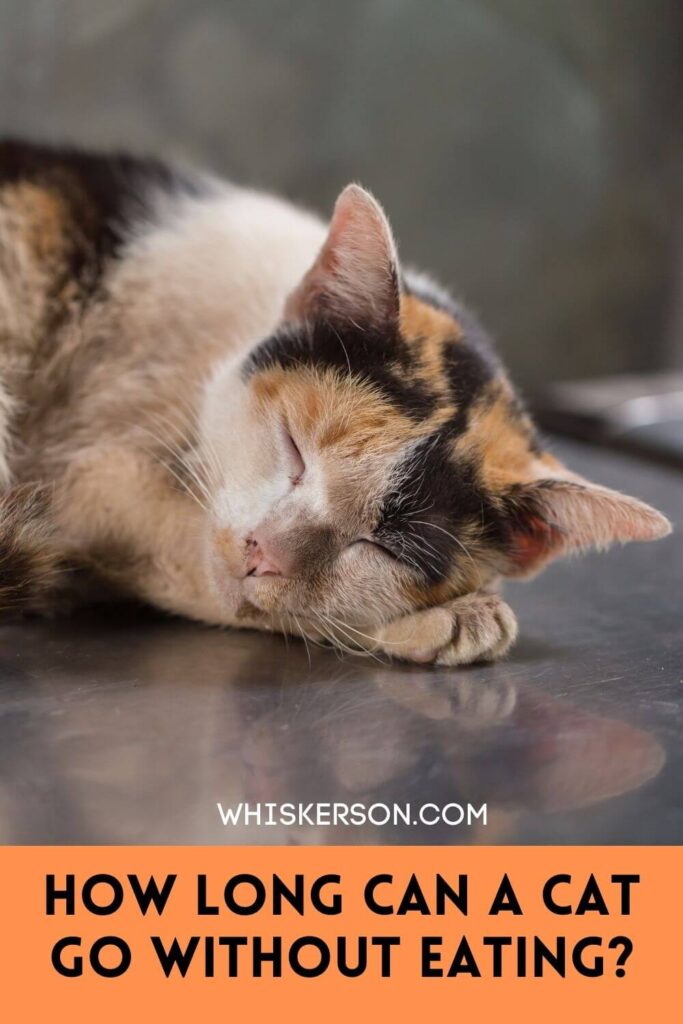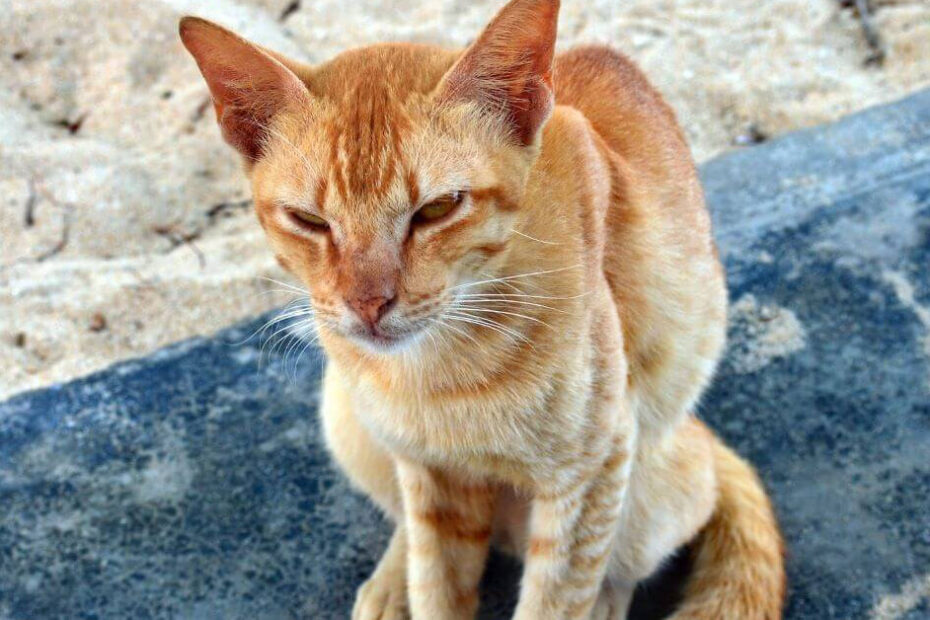You are curious about how long can a cat go without eating? A previously healthy cat can go as long as two weeks without eating. Cats that are overweight or have other major health concerns will not be able to make it two weeks without eating, and the longer a cat goes without eating the more complicated their health gets.

When your cat suddenly stops eating can be a scary thing, and you deserve to know as much as you can so you can address the problem.
This article will go over what happens when cats stop eating, reasons why they may do this, and how you should respond.
Let’s dive into this problem.
What Happens When Cats Stop Eating
Cats require a diet that is high in protein. If a cat does not get enough protein in its diet it will develop Hepatic Lipidosis, which is caused by an abundance of fat being moved to the liver. Most cats will run through their protein store in about three days.
The question is less “how long can a cat go without eating” and more “how long can a cat go without eating protein” because once that protein store is gone they turn to fat for energy.
A cat’s short digestive tract is poorly equipped to process anything other than protein. The sudden infiltration of fat is usually too much for their liver to handle (especially if the cat is overweight), and it will stop functioning normally.
If it gets bad enough, your cat’s liver may even begin to fail.
The liver is important for a number of functions, including metabolism, vitamin storage, maintaining blood clots, and removing or breaking down toxins. Improper function or failure can result in death, so it is important to start treating your cat before their liver is compromised.
How Long a Cat Can Go Without Water
Like any other animal, cats can go longer without food than they can without water. Three days with no hydration at all is disastrous to their body.
The problem here is that cats get most of their moisture from the food that they eat. This is why veterinarians and feline nutritionists highly recommend you feed your cats a wet diet.
Make sure you pay special attention to whether your cat has stopped drinking along with eating, especially if they rely on their food for hydration.
Can a Cat Starve Itself to Death?
Because of their shortest digestive tract, it is entirely possible that a cat can starve itself to death.
This does not mean that the cat is trying to die. It means that while they may respond to situations in the same way that other animals do, their body is not as well equipped to accommodate this response.
A human or a dog may lose their appetite for a few days due to depression, but there is little damage done to its body by the time it returns.
A cat who does the same may not even be able to eat by the time they want to. This is why it is essential that you begin to plan your course of action at the first instance they turn away from food.
What to Do If Your Cat Stops Eating
Luckily, you are not helpless if your cat stops eating. How you deal with the problem depends on what is causing it and how severe the issue is. It is best to start doing this at the first instance they skip a meal.
While your cat could easily start eating again the next time you offer them food, you should consider why your cat may have skipped their meal so that you can address the root of the problem.
This can be useful in preventing them from refusing food in the future, but it is also essential if you end up needing to take your cat to the vet.
Reasons Your Cat Stopped Eating
Cats can stop eating for any number of reasons. Evaluate their day-to-day life to identify any stressors. Some changes that can cause a cat to stop eating are:
- New food
- Changes in living arrangements (e.g. new owners, moving, new companions)
- Boredom
You should also consider whether this is just normal behavior for your cat. Some cats are picky eaters and will skip a meal every so often. This is also common with cats who vomit regularly due to hairballs or eating plants and cats who suffer from chronic respiratory issues.
Make sure if you are switching their food that you do so gradually. Cats are stubborn creatures, so they are more likely to refuse new food if it is an instant change.
You should also consider whether your cat is getting food from another source. Outdoor cats are free to hunt, so your cat may have just filled up before returning home.
Cats that have access to the neighborhood are also master manipulators. They may be convincing a kind neighbor that you do not feed them nearly enough or traveling streets away and posing a stray to strangers.
How to Get a Cat to Start Eating Again
Skipping one meal is not a big deal, but if your cat skipped breakfast and continues to ignore their dinner there are a few things that you can do to try to entice them to eat again.
If you believe that they have stopped eating because of stress, try moving their dish to a quiet area they are already comfortable with. Make sure there is no chance that someone or something will interfere with them if they do decide to eat.
You can appeal to a picky or stubborn eater by wetting down their food. This is helpful in the event that you are switching their food or they just seem bored with it.
There are a number of ways to do this, but the ones that have the best results are:
- Mixing with canned cat food
- Mixing with meat baby food
- Drenching with tuna juice
- Wetting the food down with water
Cats also tend to prefer their food warm, so you can try heating it up in the microwave. Just make sure you mix it up afterward and check for any particularly hot spots.
When to Seek Professional Help
If your cat has not eaten for twenty-four hours or they are showing other symptoms of illness you should reach out to your veterinarian. They can determine whether your cat has stopped eating for a number of medical reasons, including:
- Dental pain
- Gastrointestinal issues (e.g. parasites, colitis, or cancer)
- Urinary Tract Infection
- Kidney disease
- Pancreatitis
- Digestive obstruction
- Aging metabolism
While cats can go up to two weeks without food, they get weaker every day. This makes it harder to treat them as time goes on.
Pay special attention to whether they have stopped drinking as well. Their body can only go three days without water, and if you feed your cat a wet diet then they may not be properly hydrating if they are not eating.
A healthy cat who has not eaten can still be in good shape, but you need to contact an emergency veterinarian if your cat shows any of the following symptoms at any time:
- Drastic drop in weight: If you can feel bones, especially their spine, this is a key indicator that something is horribly wrong.
- Dehydration: One of the easiest ways to check for dehydration is by gently pinching their skin. If it does not immediately settle flat then they are not properly hydrated.
- Sunken eyes: While this is normal for older cats, younger cats should not have sunken eyes. Eyes should also be clear and bright.
- Yellow sclera: A sure sign of jaundice is a yellow tint to the whites of their eyes. This can be a clear indicator of Hepatic Lipidosis.
If your cat has a pre-existing health concern like diabetes you should contact your veterinarian at the first instance they refuse food. Some conditions will interfere with your cat’s appetite regularly, but most ill cats cannot afford to weaken themselves by refusing to eat.
Preventing a Cat from Refusing to Eat
You can reduce the chance that your cat stops eating by making sure you provide high-quality, nutritious food. If you can afford to feed wet food regularly that would be best.
Make sure your cat has routine visits to the vet and that there are routine checks for any underlying health problems. Working with them to prevent fleas and intestinal parasites can reduce your cat’s chance of getting sick.
Final Thoughts
A cat may stop eating for any number of reasons, so it is important that you do not freak out the first moment they turn up their nose. Stay calm and try to figure out the root of the problem.
Do what you can to try to get them to eat again, using the tips outlined in this article to make the act of eating more appealing to them.
If they continue to refuse food after 24 hours or they have other health conditions you need to contact a veterinarian to have them looked at. There is a narrow window of opportunity for a vet to start them on treatment before their health begins to rapidly decline.
